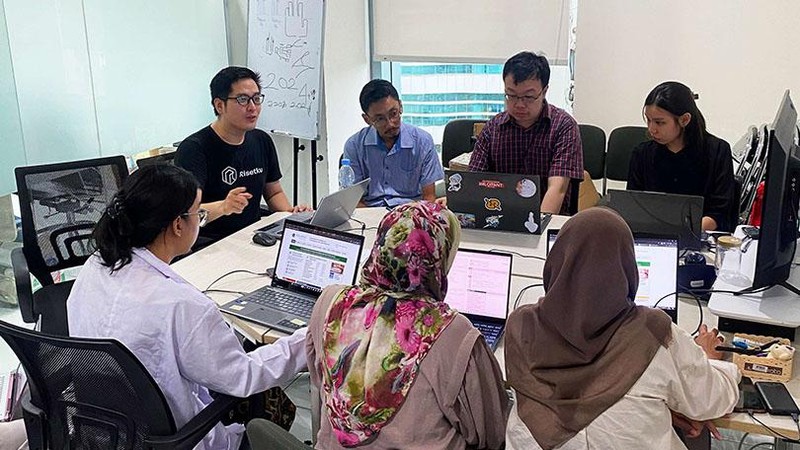

Imagine being limited to only eating oatmeal for every meal, every day. For most of us, it sounds like a bland and monotonous diet. However, for one Indonesian woman in 2024, this is her reality due to severe food allergies. Let’s delve into the world of food allergies and discover how this woman navigates through life with such dietary restrictions.
The story of a woman who can only eat oatmeal
Meet Maria, an Indonesian woman with a unique relationship with food. Due to severe food allergies, Maria’s diet is limited to oatmeal as her sole source of sustenance. For Maria, every meal revolves around this humble grain, creatively prepared in various ways to keep things interesting. Despite the challenges she faces due to her restricted diet, Maria maintains a positive outlook on life. She has embraced oatmeal not just as a necessity but as a culinary adventure, experimenting with different flavors and toppings to spice up her meals.
Maria’s journey serves as a reminder of the resilience of the human spirit and the power of adaptability in the face of adversity. With determination and creativity, she navigates through social gatherings and dining out experiences without compromising her health or happiness. Through her story, we learn that limitations can lead us down unexpected paths and open our eyes to new possibilities.
Common food allergies and their symptoms
Food allergies can vary widely from person to person, with some experiencing mild symptoms and others facing severe reactions. Common food allergens include nuts, shellfish, dairy, eggs, and wheat. Symptoms may manifest as hives, swelling of the lips or tongue, nausea, vomiting, diarrhea, or even anaphylaxis in extreme cases. It’s crucial to be aware of these common allergens and their potential effects on the body. Allergic reactions can range from mild discomfort to life-threatening emergencies. If you suspect a food allergy based on your symptoms after eating a particular food, it’s essential to seek medical advice promptly.
Managing food allergies involves identifying trigger foods through elimination diets or allergy testing. Once identified, strict avoidance is key to preventing allergic reactions. Always read ingredient labels carefully and communicate your allergies when dining out or attending social events where food is served. Remember that each individual’s experience with food allergies is unique. Seek guidance from healthcare professionals for personalized advice on managing your specific dietary restrictions due to food allergies.
How to identify and manage food allergies
Food allergies can manifest in various ways, from mild discomfort to severe reactions. Identifying the culprit can be tricky, as symptoms may not always appear immediately after consuming the allergen. Keep a food diary to track what you eat and any subsequent reactions.
Consulting with an allergist is crucial for accurate diagnosis. They may recommend skin prick tests or blood tests to pinpoint specific allergies. Once identified, managing food allergies involves strict avoidance of trigger foods. Reading labels carefully and asking about ingredients when dining out are essential practices.
In case of accidental exposure, having antihistamines or an epinephrine auto-injector on hand can be life-saving. Educating friends and family about your allergies is also important for their support and understanding. Remember, knowledge is power when it comes to managing food allergies effectively!
Alternative meal options for those with severe food allergies
Living with severe food allergies can be challenging, especially when it comes to meal options. For those like the Indonesian woman who can only eat oatmeal, creativity in the kitchen becomes essential. Fortunately, there are various alternatives available that are both safe and nutritious. One option is to explore different grains such as quinoa, rice, or buckwheat as substitutes for traditional wheat-based products. These grains can be used in dishes like salads or stir-fries to add variety to your meals.
Incorporating more fruits and vegetables into your diet is another great way to ensure you’re getting a wide range of nutrients while avoiding allergens. Smoothies, soups, and roasted vegetable bowls are delicious ways to enjoy these natural foods. For protein sources, consider plant-based options like tofu, legumes, or nuts if meat or seafood triggers allergies. These ingredients can be used in recipes ranging from vegan burgers to hearty bean stews.
Experimenting with herbs and spices can also elevate the flavors of your meals without relying on common allergens like dairy or gluten. Get creative in the kitchen and don’t be afraid to try new combinations! By exploring alternative meal options tailored to your specific allergies, you can still enjoy delicious and satisfying dishes that nourish your body without compromising your health requirements.
The impact of food allergies on daily life
Living with severe food allergies can significantly impact daily life, affecting everything from social gatherings to meal planning. The constant fear of accidental exposure looms over every meal, making simple tasks like dining out a stressful experience. Shopping for groceries becomes a meticulous process of reading labels and double-checking ingredients lists to avoid potential allergens. Family gatherings and parties require careful communication with hosts to ensure safe food options are available.
Eating at restaurants often means limited choices or having to explain dietary restrictions repeatedly. Traveling can be challenging as unfamiliar cuisines and language barriers add an extra layer of complexity when trying to navigate safe food options. Despite the challenges, managing food allergies is possible with vigilance, preparation, and support from loved ones. By prioritizing safety and being proactive in communicating needs, individuals with food allergies can still enjoy fulfilling lives while staying healthy.
Conclusion
Living with severe food allergies can be challenging, but with proper management and support, individuals like the Indonesian woman who can only eat oatmeal are finding ways to navigate their daily lives. By understanding common food allergies, identifying symptoms early on, and exploring alternative meal options, those affected by food allergies can still enjoy a fulfilling diet.
It’s essential for anyone with food allergies to work closely with healthcare professionals to develop a safe and nutritious eating plan. While it may require extra effort and vigilance, maintaining good communication with friends, family, and colleagues about your dietary restrictions can help create a supportive environment.
Remember that having a restricted diet doesn’t define you as a person; it’s just one aspect of your life. With patience, resilience, and creativity in the kitchen, managing food allergies can become more manageable over time. Embrace the journey towards better health and well-being despite the challenges posed by food allergies.







